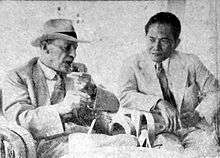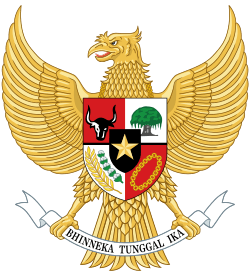Soenario
| Soenario | |
|---|---|
 Sunario (right) with British leader Clement Attlee in 1954 | |
| Foreign Minister of Indonesia | |
|
In office 1953–1955 | |
| Personal details | |
| Born |
28 August 1902 Madiun, East Java |
| Died | 18 May 1997 (aged 94) |
| Nationality | Indonesian |
| Profession | Diplomat |
Soenario (28 August 1902 – 18 May 1997[1]), also spelled Sunario, was Indonesia's minister of foreign affairs from 1953 to 1955.
Early life
Born in Madiun, East Java, Soenario was educated at Leiden University in the Netherlands and was a founder of Perhimpunan Indonesia[2] (in at least one source referred to as Perhimpunan Mahasiswa Indonesia[3]), an Indonesian students' organization, while studying at the Faculty of Law. He returned to Java in the late 1920s and established a private law practice in Bandung, while becoming active in Sukarno's Perserikatan Nasional Indonesia,[4] later renamed Partai Nasional Indonesia. In 1928, he was Bandung's delegate to the Second Indonesian Youth Congress in Batavia, where he would meet his future wife, Dina Maria Geraldine Maranta Pantouw,[5][6] then the delegate from Manado.
Politician
On 30 July 1953, Soenario was appointed minister of foreign affairs in the cabinet of the prime minister Ali Sastroamidjojo. Soenario had a key role in the formation of the Non-Aligned Movement[7][8] and was an essential participant in the Asian-African Conference in 1955. On 23 April 1955, Soenario and Zhou Enlai, premier of the People's Republic of China, signed a treaty ending the dual nationality of the Chinese living in Indonesia. Under the treaty, citizens of Chinese origin would have to choose within two years whether they have Chinese or Indonesian nationality.[9]
Ambassador
From 1956 to 1961, Soenario was Indonesia's ambassador to the Court of St. James's,[10] then chancellor of Diponegoro University in Semarang from 1963 to 1966. On 15 August 1985, he was awarded the Bintang Mahaputra Adipradana, Second Class, one of Indonesia's highest civilian awards.[11]
Then-President Suharto spoke at Soenario's funeral in 1997. In 2002, the hundredth anniversary of his birth was commemorated at the Ministry of Foreign Affairs in Jakarta.
Family
Soenario was the eldest son (and the first of 14 children) of Raden Mas Sutejo Sastrowardoyo (1878-1967), a wedono of the Uteran District in Madiun,[12] and Raden Ayu Ratna Suyati Sastrowardoyo (née Kartokusumo) (1887-1980), a noblewoman descended from a minister of the Majapahit Empire . His wife, Dina, preceded him in death in 1995. A daughter, Astrid Susanto, deputy chair of the People's Representative Council's Commission I, died in 2006.[13] He is survived by three other daughters -- Sunaryati Hartono, vice chairman of the National Ombudsman Commission of Indonesia; Sunardien, an economist; and Wuryastuti Sunario, managing director of the Indonesian Tourism Promotion Board—and a son, Irawan Sunario. A granddaughter, Maya Sunario,[14] is a member of the Indonesian-Irish Association based in Dublin.
Soenario's siblings included Sunarjo Sastrowardoyo, an elementary school teacher; Sukanti Suryochondro, an instructor in women's studies at the University of Indonesia; Subekti Sastrowardojo, who died in infancy during the 1918 influenza pandemic; Suryono Sastrowardoyo, a career diplomat whose posts included Singapore, Italy, the United States and Poland; Sumarsono Sastrowardoyo, a physician, surgeon and memoirist; Subagio Sastrowardoyo, a noted poet and academic; and Sumarsongko H. Sastrowardoyo, of the staff of the Consulate General of Indonesia in New York City.
He is a first cousin, once removed, of Nugroho Wisnumurti, who was Indonesia's Permanent Representative to the United Nations and Other International Organizations in Geneva, Switzerland from 2000 to 2004.[15] Two nephews, Rahadyan Sastrowardoyo[16][17] and Hartriono B. Sastrowardoyo, are U.S.-based journalists (the latter for The Asbury Park Press[18]). The actress Dian Sastrowardoyo is a grandniece.
Like many Javanese, Mr. Soenario had just one name, though the practice of a given name plus a surname chosen after higher education had begun with his father in 1896. In the old Dutch spelling, the family name had been spelled Sastrowardojo but, even prior to the spelling reform in Indonesia in 1972, some members had changed the j to a y—and one brother, Sudibbyo, spelled the name Sastrowardhoyo, reflecting the aspirant d.
The family name was derived from sastra (Sanskrit, 'writings') and wardaya (Sanskrit, 'heart'), so literally meant "writings of the heart."
His father, Sutejo Sastrowardoyo, traced the family's ancestry back to 15th century Java.
Bibliography
- Sunaryati Hartono, Hendarmin Djarab, and Lili Irahali, eds., Semangat Kebangsaan Dan Politik Luar Negeri Indonesia : Peringatan 100 Tahun Prof. Mr. Sunario, Mantan Menteri Luar Negeri, Perintis Kemerdekaan, 28 Agustus 1902-28 Agustus 2002. Bandung: Penerbit Angkasa Bandung, 2002. ISBN 979-665-193-9
References
- http://www.geocities.com/slowloris9/Diary/060128artic.txt
- http://www.ibiblio.org/obl/docs/cty-PhD_thesis.htm
- http://www.ibiblio.org/obl/docs/cty-AJXCH4A.htm
- Asia-Africa Speaks From Bandung. Jakarta: Ministry of Foreign Affairs, Republic of Indonesia, 1955.
- Kahin, George McTurnan. The Asian-African Conference: Bandung, Indonesia, April 1955. Ithaca: Cornell University Press, 1956.
- Mackie, Jamie. Bandung 1955: Non-alignment And Afro-Asian Solidarity. Singapore: Editions Didier Millet, 2005. ISBN 981-4155-49-7
Notes
- ↑ May 1997
- ↑ http://www.kompas.com/kompas-cetak/0210/28/opini/suna42.htm
- ↑ 1910 to 1940: New Nationalism
- ↑ IN/POL: KMP - Calls for New PDI Cou
- ↑ Apa dan Siapa - SOENARIO
- ↑ http://www.citraaditya.com/pengarang.php?id=69
- ↑ http://www.pathfinder.com/Asiaweek/97/0530/feat7.html
- ↑ Backgrounder - PGMA's Attendance to the Asian-African Summit 2005 in Jakarta
- ↑ "Miscellaneous / This Day That Age / Dual nationality to end". The Hindu. 23 April 1955.
- ↑ Embassy of the Republic of Indonesia in London - United Kingdom website
- ↑ Rahadyan Sastrowardoyo account on Flickr
- ↑ IN/BIO: TEMPO - Subagio Sastrowardo
- ↑ Astrid Susanto (Maria Antonia Astrid Sunarti Susanto), Prof Dr | Tokoh Indonesia
- ↑ Indonesian-Irish Association website
- ↑ Permanent Mission of Indonesia to the United Nations and Other International Organizations in Geneva website
- ↑ Sastrowardoyo, Rahadyan. "'Babylon 5' Enters Its Final Stages." The New York Times, 19 July 1998.
- ↑ Sastrowardoyo, Rahadyan. "Flashpoints That Define Or Break Apart a Community." Rediff.com, 1 June 1999
- ↑ Sastrowardoyo, Hartriono B. "Autistic Students Benefit From Riding Program." The Asbury Park Press, 20 January 2007. Accessed 23 January 2007.
| Diplomatic posts | ||
|---|---|---|
| Preceded by Soepomo |
Ambassador of Indonesia to the United Kingdom 1956–1961 |
Succeeded by B.M. Diah |
